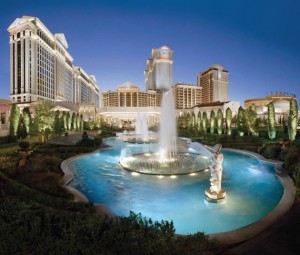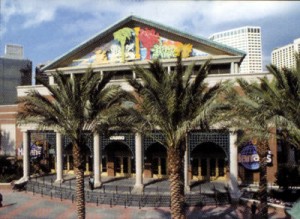 Caesars Entertainment posted a staggering, $1.76 billion loss (-$12.83/share), as some analysts fret that the recent fire sale of four casinos to Caesars Growth Partners may starve parent company Caesars Entertainment Operating Co. of cash flow. Meanwhile, Big Caesars has to decide whether to take the $2.2 billion it was paid by Little Caesars (Caesars Growth Properties) and reduce debt or try to grow the company faster than the bill collectors can keep pace. “This transaction is clearly negative from a leverage perspective … due to the loss of [cash flow] from the sale of the three assets,” said one respected analyst.
Caesars Entertainment posted a staggering, $1.76 billion loss (-$12.83/share), as some analysts fret that the recent fire sale of four casinos to Caesars Growth Partners may starve parent company Caesars Entertainment Operating Co. of cash flow. Meanwhile, Big Caesars has to decide whether to take the $2.2 billion it was paid by Little Caesars (Caesars Growth Properties) and reduce debt or try to grow the company faster than the bill collectors can keep pace. “This transaction is clearly negative from a leverage perspective … due to the loss of [cash flow] from the sale of the three assets,” said one respected analyst.
If you’re a bondholder in Caesars, prepare to take a bath. “The company is positioning it so that there’s really not a lot of options for the bondholders, and therefore the only way out is to do a distressed-debt exchange. They’re taking some of these assets and moving them to high ground, and essentially allowing the flood to take over the rest,” CreditSights analyst Chris Snow told Bloomberg. The incentive for bondholders to take distressed debt is the unspoken threat of bankruptcy, although Caesars CEO Gary Loveman has publicly taken that weapon off the table. However …
So-called parent guarantees make be removed from second liens by Caesars, which “would leave bondholders with less recourse to other company assets should the operating unit file  for bankruptcy.” Paradoxically, the value of Caesars’ bonds would have to fall further for a distressed-debt swap to be attractive. Interest payments alone on Big Caesars’ $21 billion debt could swallow Little Caesars’ $2.2 billion payment without a trace. According to analyst Kim Noland, Big Caesars “will be left with Atlantic City assets where the market continues to basically tank.” Fitch Ratings credit analyst Michael Paladino has put a CC rating on Big Caesars bonds, a ranking that “indicates that default of some kind appears probable.”
for bankruptcy.” Paradoxically, the value of Caesars’ bonds would have to fall further for a distressed-debt swap to be attractive. Interest payments alone on Big Caesars’ $21 billion debt could swallow Little Caesars’ $2.2 billion payment without a trace. According to analyst Kim Noland, Big Caesars “will be left with Atlantic City assets where the market continues to basically tank.” Fitch Ratings credit analyst Michael Paladino has put a CC rating on Big Caesars bonds, a ranking that “indicates that default of some kind appears probable.”
(In a related item, Caesars blames Atlantic City for its woes … which means it makes perfect sense to covet Revel Resort.)
Some question Caesars’ fiscal discipline. Deutsche Bank analyst Andrew Zarnett voices  doubts that Big Caesars will retire debt, pointing out that proceeds from the 2012 sale of Harrah’s Maryland Heights were rolled into new casinos. Remarking that the recent sale of Harrah’s New Orleans and three other casinos moved them “away from the weaker Caesars Entertainment into healthier entities,” Fitch Ratings Service analyst Alex Bumazhny noted that it also protects them from a potential Chapter 11. Little Caesars sure looks like the getaway car in which Loveman, Texas Pacific Group, Apollo Management, George Soros and John Paulson all zoom away from the wreckage of Big Caesars.
doubts that Big Caesars will retire debt, pointing out that proceeds from the 2012 sale of Harrah’s Maryland Heights were rolled into new casinos. Remarking that the recent sale of Harrah’s New Orleans and three other casinos moved them “away from the weaker Caesars Entertainment into healthier entities,” Fitch Ratings Service analyst Alex Bumazhny noted that it also protects them from a potential Chapter 11. Little Caesars sure looks like the getaway car in which Loveman, Texas Pacific Group, Apollo Management, George Soros and John Paulson all zoom away from the wreckage of Big Caesars. Then, perhaps after a Chapter 11 restructuring of Big Caesars, it exercises its option to buy back Little Caesars in 2017.
Too far-fetched, eh? Nothing seems beyond belief where Caesars is concerned — except that it’s stayed standing as long as it has. Loveman must be a master of ledger-demain.


The call right may only be exercised by Caesars Entertainment and/or its subsidiaries if, at the time of such exercise, (i) Caesars Entertainment has a minimum liquidity of $1.0 billion and a maximum net debt leverage ratio of 9.00 to 1.00, and (ii) no event of default has occurred.
CZR will not be able to satisfy those requirements, so they will not be able to exercise the call right, and CACQ will remain independent. They are nowhere close to the leverage test, and the leverage profile is getting worse. Defaulting on the debt also cancels their ability to exercise the call right.
Thank you for the correction and additional context, Tony.
Thank you for the update.
[…] I will try to dig in if these losses are related to one time charges or an ongoing problem. https://www.lasvegasadvisor.com/stiffs-and-georges/?p=12971 […]